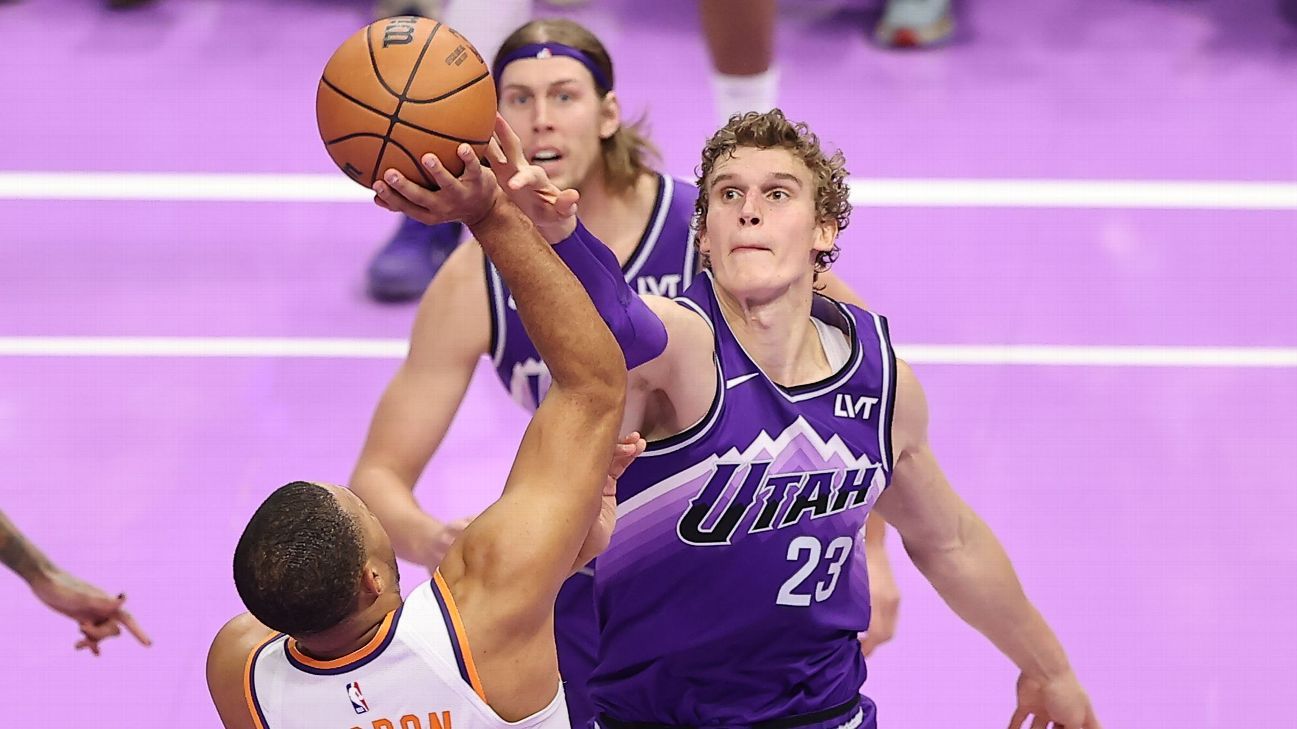AllBuffs | Unofficial fan site for the University of Colorado at Boulder Athletics programs
-
Prime Time. Prime Time. Its a new era for Colorado football. Consider signing up for a club membership! For $20/year, you can get access to all the special features at Allbuffs, including club member only forums, dark mode, avatars and best of all no ads ! But seriously, please sign up so that we can pay the bills. No one earns money here, and we can use your $20 to keep this hellhole running. You can sign up for a club membership by navigating to your account in the upper right and clicking on "Account Upgrades". Make it happen!
You are using an out of date browser. It may not display this or other websites correctly.
You should upgrade or use an alternative browser.
You should upgrade or use an alternative browser.
NBA (and other pro league) Buffs
- Thread starter SewallBeach
- Start date
8. The Spencer Dinwiddie scalability conundrum
Dinwiddie's languid season feels emblematic of a vanilla Nets team that has lots of guards and wings but no one who really gets anywhere north-south. It's almost enough to make you miss Ben Simmons.
The Nets are 18th in offensive efficiency and 21st on defense. Only the Pistons and Milwaukee Bucks force fewer turnovers. Brooklyn rarely gets to the rim or the line. Outside of Day'Ron Sharpe's offensive rebounding sprees and some grimy Dennis Smith Jr. defense, it plays with little force. You barely feel the Nets.
They have fallen to 16-24 after being swept by the Blazers (!), part of a sad four-team race -- with the Hawks, Bulls and the remains of the Raptors -- for the East's last two play-in spots.
Dinwiddie is shooting 39% overall and 32% on 3s. He has attempted six or fewer field goals in five of Brooklyn's past seven games -- and only 16 2-point shots total in that stretch. That is a point guard in name only -- floating, half-present.
Dinwiddie is averaging 14 drives per 100 possessions -- the second-lowest rate of his career, per Second Spectrum. His shots at the rim are near a career-low level. Both numbers are tracking down. It almost looks as if Dinwiddie is on some kind of strike.
What makes this more bizarre is that Dinwiddie still ranks as one of the league's most efficient pick-and-roll ball handlers -- the precise skill Brooklyn so badly needs. The Nets have scored 1.23 points per possession on trips featuring a Dinwiddie pick-and-roll, per Second Spectrum -- 14th among 166 ball handlers who have run at least 100 such plays. He ranks in the top 25% of that sample in assist rate (high!) and turnover rate (low!) out of the pick-and-roll. (That said, every Dinwiddie lob pass is an adventure.)
He's just doing less in an offense centered at times around Mikal Bridges and Cam Thomas, and Dinwiddie is not a massive threat away from the ball.
That has always been the conundrum of Dinwiddie's game: He's best as an on-ball engine, but any team with Dinwiddie as the undisputed No. 1 ball handler isn't getting far. For whatever reason, the Dinwiddie equation has tilted more of whack -- and especially so lately.

Lowe: How Utah's success will impact its rebuild, a backfired Hawks trade that's hurting the defense and OKC's special two-man game
What the Jazz can learn from the Daryl Morey Rockets on how not to bottom out, why Atlanta's ball-dominant guards in a smallish backcourt isn't working on defense and the Thunder duo building a special connection.
Buffsbball
Well-Known Member
Jabari has started the last 4 for the lowly blazers. 14 and 13 tonight.
Hope that's a good spot for him. Haven't seen great things about his year
I hope Spencer gets a championship opportunity before he retires. He has been traded to a lot of bad teams and never really gotten a playoff run.
Glad he's free of whatever the fvck was going on in Brooklyn.I hope Spencer gets a championship opportunity before he retires. He has been traded to a lot of bad teams and never really gotten a playoff run.
The Mav's run was fun!I hope Spencer gets a championship opportunity before he retires. He has been traded to a lot of bad teams and never really gotten a playoff run.
This is just fantasy at this point but heard mention that the Raptors may have been more interested in his expiring contract than keeping him. Mentioned that they might just buy him out and release him.I hope Spencer gets a championship opportunity before he retires. He has been traded to a lot of bad teams and never really gotten a playoff run.
Don't think that happens but would he then be interested in signing with Denver for the vet minimum.
I also wonder how well he would fit. Spencer is a player who is most effective dominating the ball, something that wouldn't happen with the Nuggets.
I had an extended conversation about the Raps with a coworker fan recently.Hope that's a good spot for him. Haven't seen great things about his year
They are heading into FULL rebuild mode. It's going to be extremely painful for them. I hope Spencer is flipped to a contender for picks.
It's definitely a championship opportunity in Denver. I think his dream from the time he was a kid was to be a Laker, so I think that's the most likely if he's going to take a discounted contract especially with all the business opportunities LA would provide at the end as he looks towards his future as an entrepreneur.This is just fantasy at this point but heard mention that the Raptors may have been more interested in his expiring contract than keeping him. Mentioned that they might just buy him out and release him.
Don't think that happens but would he then be interested in signing with Denver for the vet minimum.
I also wonder how well he would fit. Spencer is a player who is most effective dominating the ball, something that wouldn't happen with the Nuggets.
Lakers aren't going to compete for the championship but other than that would be a good fit for him.It's definitely a championship opportunity in Denver. I think his dream from the time he was a kid was to be a Laker, so I think that's the most likely if he's going to take a discounted contract especially with all the business opportunities LA would provide at the end as he looks towards his future as an entrepreneur.
In addition to the off-court advantages they need somebody who can provide enough of a scoring threat to take some of the pressure off the stars. It also may become a long-term fit for him if it works. Denver is tight enough on the cap that they are going to have trouble keeping the core guys (may see MPJ moved) signing a higher priced veteran for the bench isn't going to happen.
Too bad there's no place for him in Denver.
Glad he has some good options on playoff teams. Will be fun!
I’m amazed Burks is still in the NBA. What a career.
Heading home.
Heading home.
Happy for Spencer, likely a long time Laker fanboy, and hope he plays well, but hate him in that Jersey, and we will have to beat his ass just like the rest of the Lakers
Share:




